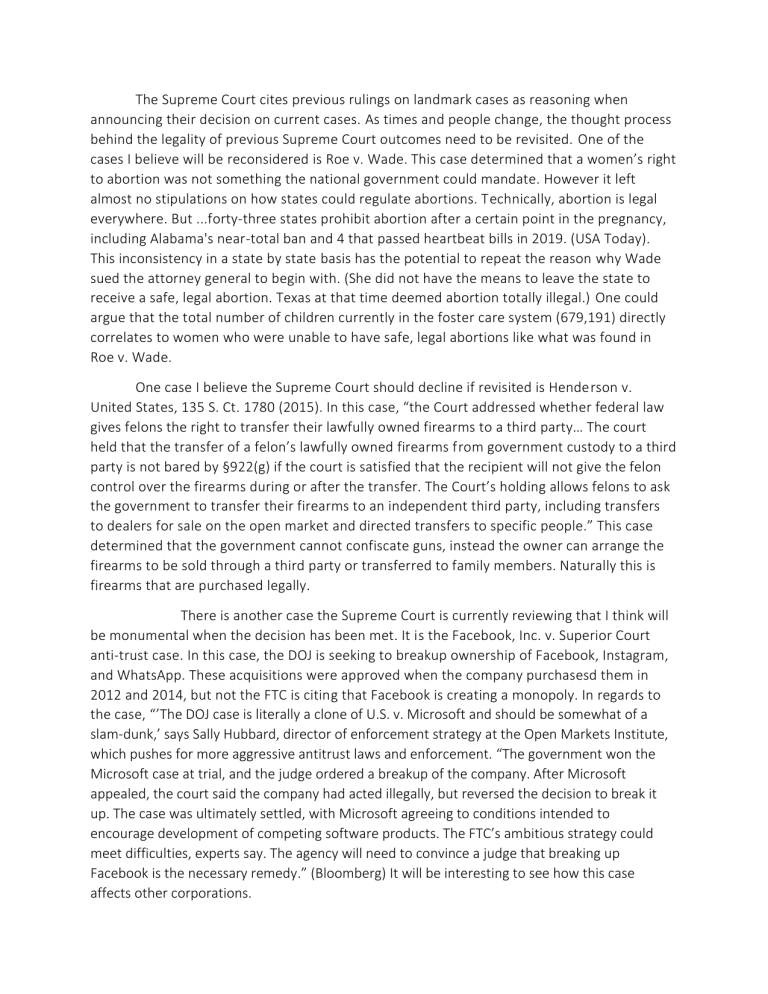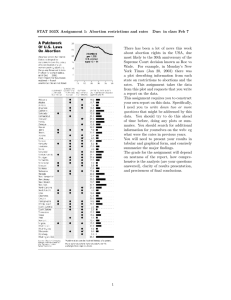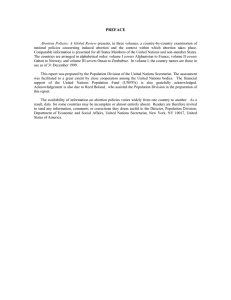Supreme Court Cases: Roe v. Wade, Henderson, Facebook Antitrust
advertisement

The Supreme Court cites previous rulings on landmark cases as reasoning when announcing their decision on current cases. As times and people change, the thought process behind the legality of previous Supreme Court outcomes need to be revisited. One of the cases I believe will be reconsidered is Roe v. Wade. This case determined that a women’s right to abortion was not something the national government could mandate. However it left almost no stipulations on how states could regulate abortions. Technically, abortion is legal everywhere. But ...forty-three states prohibit abortion after a certain point in the pregnancy, including Alabama's near-total ban and 4 that passed heartbeat bills in 2019. (USA Today). This inconsistency in a state by state basis has the potential to repeat the reason why Wade sued the attorney general to begin with. (She did not have the means to leave the state to receive a safe, legal abortion. Texas at that time deemed abortion totally illegal.) One could argue that the total number of children currently in the foster care system (679,191) directly correlates to women who were unable to have safe, legal abortions like what was found in Roe v. Wade. One case I believe the Supreme Court should decline if revisited is Henderson v. United States, 135 S. Ct. 1780 (2015). In this case, “the Court addressed whether federal law gives felons the right to transfer their lawfully owned firearms to a third party… The court held that the transfer of a felon’s lawfully owned firearms from government custody to a third party is not bared by §922(g) if the court is satisfied that the recipient will not give the felon control over the firearms during or after the transfer. The Court’s holding allows felons to ask the government to transfer their firearms to an independent third party, including transfers to dealers for sale on the open market and directed transfers to specific people.” This case determined that the government cannot confiscate guns, instead the owner can arrange the firearms to be sold through a third party or transferred to family members. Naturally this is firearms that are purchased legally. There is another case the Supreme Court is currently reviewing that I think will be monumental when the decision has been met. It is the Facebook, Inc. v. Superior Court anti-trust case. In this case, the DOJ is seeking to breakup ownership of Facebook, Instagram, and WhatsApp. These acquisitions were approved when the company purchasesd them in 2012 and 2014, but not the FTC is citing that Facebook is creating a monopoly. In regards to the case, “’The DOJ case is literally a clone of U.S. v. Microsoft and should be somewhat of a slam-dunk,’ says Sally Hubbard, director of enforcement strategy at the Open Markets Institute, which pushes for more aggressive antitrust laws and enforcement. “The government won the Microsoft case at trial, and the judge ordered a breakup of the company. After Microsoft appealed, the court said the company had acted illegally, but reversed the decision to break it up. The case was ultimately settled, with Microsoft agreeing to conditions intended to encourage development of competing software products. The FTC’s ambitious strategy could meet difficulties, experts say. The agency will need to convince a judge that breaking up Facebook is the necessary remedy.” (Bloomberg) It will be interesting to see how this case affects other corporations. https://www.usatoday.com/in-depth/news/nation/2019/05/15/abortion-law-map-interactiveroe-v-wade-heartbeat-bills-pro-life-pro-choice-alabama-ohio-georgia/3678225002/ https://adoptionnetwork.com/knowledge-hub/adoption-myths-facts/domestic-usstatistics/#:~:text=There%20are%20about%201.5%20million,one%20out%20of%2050%20chil dren. https://www.bloomberg.com/news/articles/2020-12-16/facebook-fb-antitrust-case-hasmuch-different-goal-than-google-s-googl





